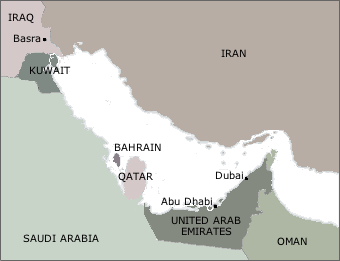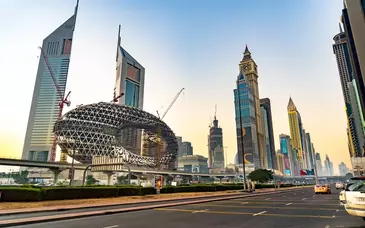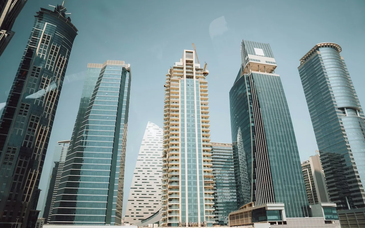
World Factbook as of November 2014: "The UAE has an open economy with a high per capita income and a sizable annual trade surplus. Successful efforts at economic diversification have reduced the portion of GDP based on oil and gas output to 25%. Since the discovery of oil in the UAE more than 30 years ago, the country has undergone a profound transformation from an impoverished region of small desert principalities to a modern state with a high standard of living. The government has increased spending on job creation and infrastructure expansion and is opening up utilities to greater private sector involvement."
Economic growth rate
2013: 4%
2012: 4.4%
Military expenditures as a percentage of GDP
2011: 5.5 %
People
Living in an urban area
2011: 84.4%
Population growth rate:
2014: 2.71%, 21st of 233 countries
2010: More then 80 percent of the population are immigrants. Other Arabs and Iranians are 23 percent. South Asian (probably mostly Pakistani) are 50 percent. Others, 8 percent. About half the population is from India. Some others are Palestinians, Filipino, Iranians, Egyptians, Somalians and Sudanese. Around 100,000 British nationals live in the country. There are more than twice as many males as females.
Many people from Asia and East Europe go to work as domestic servants, labor workers or secretaries but find themselves actually forced into involuntary servitude and sexual practices, according to human rights organizations.
Net migration rates
2013: A net gain of 13.7 per 1,000 population
2012: A net gain of 16.8 per 1,000 population.
2011: A net gain of 19 per 1,000 population.
Government
Independence from the United Kingdom on 2 December 1971.
The UEA is a federation of seven monarchies. Its rulers (emirs) retain absolute power within their emirates.
A Federal Supreme Council (FSC), composed of the seven emirate rulers, is the highest constitutional authority in the UAE. It establishes general policies and sanctions federal legislation. It meets four times per year.
The emirs chose one of their number to be the president of the federation. He has a prime minister who has a cabinet (council of ministers) appointed by the president.
Government and religion are united, with Islam the official religion. Arabic is the official language.
The judiciary is a dual system of sharia and civil courts. Sharia law includes imprisonment for blasphemy.
Capital: Abu Dhabi.
Recent History
March, 2008. Troops from the United Arab Emirates are in Afghanistan, armed for self-defense but doing political rather than combat work. The BBC reports that they are delivering humanitarian aid and telling their "brother" Arab-speakers that their coalition partners, Britain and the United States, have come to Afghanistan to give them peace.
April 12, 2011. Twitter: Nepali slaves in the Middle East - video.
Sources:
The World Factbook

